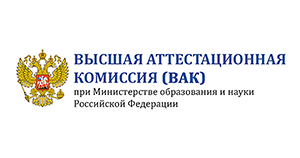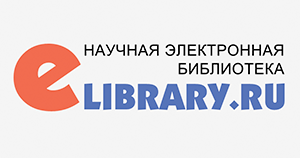|
Перейти
на сайт журнала "Врач" |
Перейти на сайт журнала "Медицинская сестра"
|
Перейти на сайт журнала "Фармация"
|
Перейти на сайт журнала "Молекулярная медицина"
|
Перейти на сайт журнала "Вопросы биологической, медицинской и фармацевтической химии"
|
Журнал включен в российские и международные библиотечные и реферативные базы данных
|
ВАК (Россия)
|
РИНЦ (Россия)
|
Эко-Вектор (Россия)
|
SOME ASPECTS OF THE PRECLINICAL STUDY OF THE SAFETY OF THE DRY EXTRACT OF POTENTILLA ALBA L.
DOI: https://doi.org/10.29296/25877313-2022-04-06
Issue:
4
Year:
2022
Relevance. Recently for the treatment of thyroid diseases it has been suggested to use herbal remedies, which are able to influence the functional activity and structure of the thyroid gland. One of such perspective objects is considered to be Potentilla alba L., Rosacea family, which is an effective regulator of thyroid hormones level and is used in a complex treatment of the mentioned pathology of endocrine system.
The purpose. To estimate general toxic effect of the dry extract of Potentilla alba L. in conditions of chronic experience to determine a possibility of development on its base of new medicines recommended to treat thyroid diseases.
Materials and methods. A chronic experiment was carried out on male and female Wistar rats. The studied extract was administered intragastrical-ly for 90 days in doses of 25, 125 and 375 mg/kg. The control animals were given water. Integral health indexes of experimental animals were regis-tered, peripheral blood samples were taken to determine hematological and biochemical indexes, functional state of cardiovascular system (ECG study), central nervous system by orientation reactions in "open field" test, excretory function of kidneys against 3% water load were studied. At the end of the experiment pathohistological examination of the internal organs of the rats was carried out.
Results. Long-term administrations of the dry extract of Potentilla alba L. into stomach of clinically healthy rats of both sexes in 2,5, 12,5-37,5 times therapeutic doses caused hypothyroidism and hypolipidemic action. The dry extract in all tested doses showed no toxic effect on blood, cardiovascular and nervous system of rats. Prolonged administration of studied extract at the maximum tested dose (375 mg/kg) resulted in a moderate damaging effect on the liver and kidneys of rats of both sexes as well as the testes. A threshold dose of 25 mg/kg was established.
Conclusions. Results of the investigation were grounds for development of new thyrotropic drugs of systemic action (0,050 g capsules, 0,150 g tab-lets) based on the studied extract and to recommend them for further investigation.
Keywords:
Potentilla alba L.
dry extract
chronic toxicity.
References:
- Dedov I.I. Jendokrinologija: nacional'noe rukovodstvo. Pod red. I.I. Dedova, G.A. Mel'nichenko. 2-e izd., pererab. i dop. M.: GJeOTAR-Media, 2019.
- Kuznecov E.V., Zhukova L.A., Pahomova E.A., Gulamov A.A. Jendokrinnye zabolevanija kak mediko-social'naja problema sovremennosti. Sovremennye problemy nauki i obrazovanija. 2017; № 4. S. 62. URL: http://science-education.ru/ru/article/view?id=26662
- Savina A.A. Tendencii pokazatelej zabolevaemosti boleznjami jendokrinnoj sistemy vzroslogo naselenija Rossijskoj Federacii. Social'nye aspekty zdorov'ja naselenija [setevoe izdanie] 2021; 67(4):6. URL: http://vestnik.mednet.ru/content/view/1285/30/lang,ru/
- Vejcman I.A., Mazepa S.I. Osobennosti pitanija pri narushenijah funkcii shhitovidnoj zhelezy (obzor literatury). FOCUS Jendokrinologija.2021; 3: 93–95. DOI: 10.47407/ef2021.2.3.0041
- Daniel Augustynowicz, Magdalena Podolak, Klaus Peter Latté, Michał Tomczyk New Perspectives for the Use of Potentilla Alba Rhizomes to Treat Thyroid Gland Impairments. Planta Med. 2021 Oct 29. DOI: 10.1055/a-1663-6461.
- Lupanova I.A., Krepkova L.V., Ferubko E.V., Trumpe T.E., Bortnikova V.V., Babenko A.N., Kurmanova E.N., Fateeva T.V., Mizina P.G., Sidel'nikov N.I. Novye lekarstvennye sredstva rastitel'nogo proishozhdenija VILAR. M.: FGBNU VILAR. 2021. 160 s.
- Alefirov A.N. Fitoterapija zabolevanij shhitovidnoj zhelezy. SPb, 2008; 152 s.
- Turchaninova L.I. Experience of using phytopreparation Alba (root extract of the Potentilla Alba) in complex treatment of thyroid pathology in children and adolescents. Lik Sprava. 2014; 34: 125–129.
- Patent na izobretenie № 2708260 C1(RF) Farmacevticheskaja kompozicija dlja profilaktiki i lechenija gipotireoza shhitovidnoj zhelezy. Semkina O.A., Dzhavahjan M.A., Kachalina T.V., Malysheva N.A., Meshkov A.I., Mondodoev A.G., Sidel'nikov A.N., Krepkova L.V., Ferubko E.V., 2019.
- Arhipova Je.V., Shantanova L.N., Mondodoev A.G. Tireotropnye svojstva (Potentilla Alba L.). Vestnik Burjatskogo Gosudarstvennogo universiteta. 2014; 12: 118–122.
- Bortnikova V.V., Babenko A.N., Kuzina O.S., Radimich A.I. Rezul'taty ocenki toksichnosti lapchatki beloj (Potentilla Alba L.) jekstrakta suhogo v ostrom jeksperimente. Voprosy biologicheskoj, medicinskoj i farmacevticheskoj himii. 2019; 22(7): 51–54.
- Bortnikova V.V., Krepkova L.V., Mizina P.G., Gus'kova T.A. Issledovanija immunotoksicheskih i allergizirujushhih svojstv lapchatki beloj (Potentilla Alba L.) jekstrakta suhogo. Toksikologicheskij vestnik. 2018; 4: 15−19. DOI: https://doi.org/10.36946/0869-7922-2018-4-15-19
- Savinova T.B., Krepkova L.V., Bortnikova V.V. Vlijanie suhogo jekstrakta lapchatki beloj (Potentilla Alba L.) na razvitie potomstva v antenatal'nom i postnatal'nom periodah razvitija. Voprosy biologicheskoj, medicinskoj i farmacevticheskoj himii. 2018; 21(6): 43–48. DOI: https://doi.org/10.29296/25877313-2018-06-08.
- Babenko A.N., Dmitrieva O.P., Krepkova L.V. Vlijanie lapchatki beloj jekstrakta suhogo na potomstvo krys pri vvedenii do i v period beremennosti. Sb. tr. Mezhdunar.konf. mol. uch. «Sovrem. tend. razvitija tehnologij zdorov'esberezhenija». FGBNU VILAR, 2020; 410−415. DOI: 0.52101/9785870190921_2021_8_410
- Burova A.E., Sajbel' O.L., Meshkov A.I. Razrabotka metodik analiza fenol'nyh soedinenij kornevishh s kornjami lapchatki beloj (Potentilla Alba L.). Voprosy obespechenija kachestva lekarstvennyh sredstv. 2016; 13(3): 9−14.
- Lemjaseva S.V., Krepkova L.V., Babenko A.N. Gipolipidemicheskoe dejstvie suhih rastitel'nyh jekstraktov na modeli giperlipidemii u krys. Sb. tr. IX Mezhdunar. nauch. konf. mol. uch. «Sovremennye tendencii razvitija tehnologij zdorov'esberezhenija». 2021; 452–458.
- Tarahovskij, Ju.S., Kim Ju. A., Abdrasilov B. S., Muzafarov E. N. Flavonoidy: biohimija, biofizika, medicina. Pushhino: Sunchrobook, 2013; 310 c.
- Yu Nie, Stephen R Stürzenbaum. Proanthocyanidins of Natural Origin: Molecular Mechanisms and Implications for Lipid Disorder and Aging-Associated Diseases.Adv Nutr. 2019 May 1; 10(3): 464-478. DOI: 10.1093/advances/nmy118.
- Richard A Dixon, De-Yu Xie, Shashi B Sharma. Proanthocyanidins--a final frontier in flavonoid research? New Phytol. 2005 Jan; 165(1): 9–28. DOI: 10.1111/j.1469-8137.2004.01217.x.
- Huchieva M.A., Perova N.V., Ahmedzhanov N.M. Rastitel'nye steriny i stanoly kak pishhevye faktory, snizhajushhie giperholesterinemiju putem ingibirovanija vsasyvanija holesterina v kishechnike. Kardiovaskuljarnaja terapija i profilaktika. 2011; 10(6): 124–132.
- Babu S., Jayaraman S. An update on β-sitosterol: A potential herbal nutraceutical for diabetic. Biomedicine & Pharmacotherapy. 2020; 131: 110702: 1–8.
- Sayeed, M.S.B., Karim S.М.R., Sharmin T., Morshed М.М. Critical Analysis on Characterization, Systemic Effect, and Therapeutic Potential of Beta-Sitosterol: A Plant-Derived Orphan Phytosterol. Medicines. 2016; 3(29): 1–25.
- Krepkova L.V., Bortnikova V.V., Babenko A.N., Mizina P.G., Mkhitarov V.A., Job K.M., Sherwin C.M., Enioutina E.Y. Effects of a new thyrotropic drug isolated from Potentilla alba on the male reproductive system of rats and offspring development. BMC Complement. Med. Ther. 2021; 21(1): 31. DOI: 10.1186/s12906-020-03184-z. Дата публикации: 13.01.2021.








